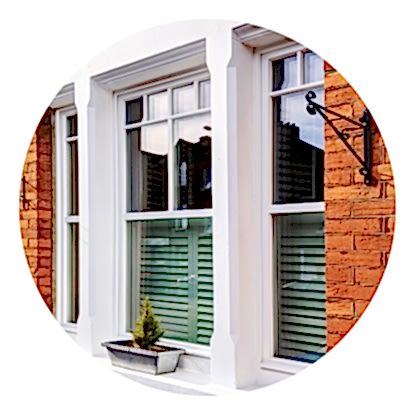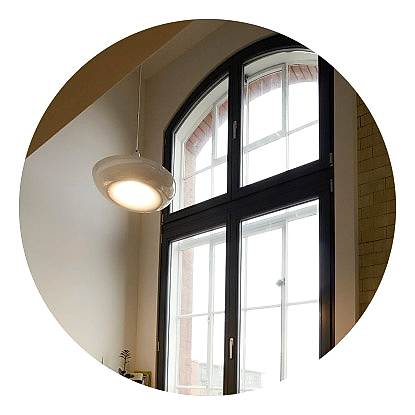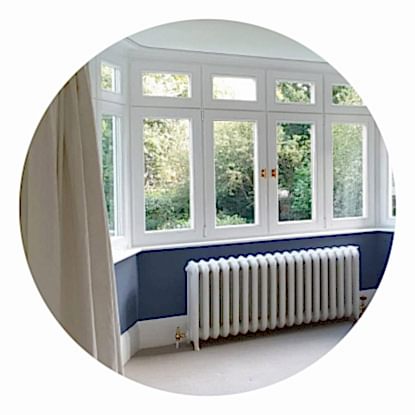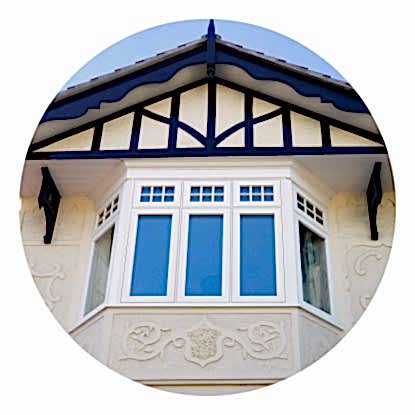ACOUSTIC GLAZING
The biggest contributing factor to reducing noise pollution through your windows, noise reduction glazing (also known as acoustic glass) is a specialised glass system designed to dampen and dissipate noise.
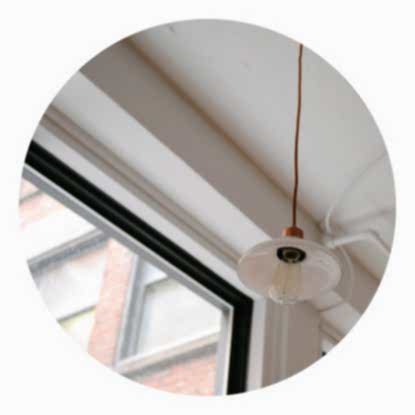
ACOUSTIC GLASS DESIGN
Glass is a rigid, inelastic material, which means that it is a bad conductor of sound. In fact, it is rather good at reflecting noise. The problem is that the glazing inside of your windows tends to be thin, meaning that it can’t put up much of a fight. If untreated (or as a single pane) it will do relatively little to actually prevent noise from entering your home.
This is why standard single and double glazing is not recommended if you are suffering from the effects of noise pollution.
HOW SOUNDPROOF GLAZING WORKS
Soundproof glazing works by deflecting and dissipating the sound wave. Acoustic glass does this by:
- Adjusting the thickness of the glass.
- Adding interlayers between the glazing.
- Increasing spacing between the glazing.
CAN I INSTALL ACOUSTIC GLASS IN MY WINDOWS?
The simple answer is yes. However, it is important to note that optimum results are achieved by installing acoustic glass within specialist acoustic windows. Most traditional uPVC or timber frames will not be able to support thicker, acoustic glazing, and if the frames themselves are not treated, installing acoustic glass will effectively be redundant.
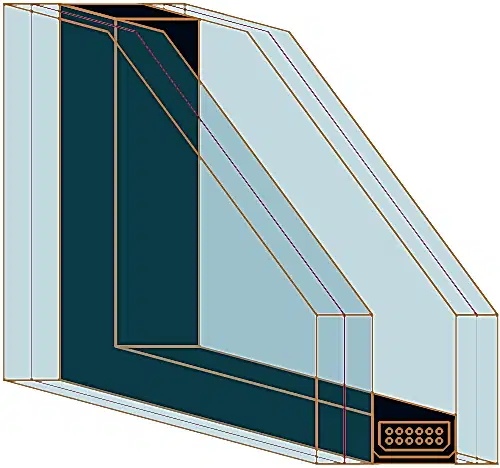
Thickness
Simply; the thicker the glass, the better it is at reducing noise. However, glass has a natural coincidence frequency. Any thickness of glass will have a pitch at which it actually amplifies the sound rather than stopping it. This is why double and triple glazed acoustic windows are recommended. These windows employ glass of different thicknesses to counteract the coincidence frequency.
Interlayers
A thin (~0.38mm or two layers ~0.78mm) layer of polyvinyl butyral resin (PVB) is used to glue the sheets of glass together. Originally used for safety and security, PVB also provides excellent acoustic performance by dampening sound waves. Unlike other acoustic resins, PVB does this without compromising on light transmittance or impacting performance of the window.
Spacing
The acoustic performance of soundproof glazing is greatly improved by increasing the gaps between the glass. However, in most homes, space is at a premium with most homeowners preferring to retain as much cill space as possible. Noise reduction can be further increased by filling the gap with heavy inert gases such as argon and krypton, though this is an expensive solution.
Resonance and Coincidence Effects
- When both panes of glass are the same thickness, they are likely to resonate at the same frequencies. This resonance amplifies the sound at certain frequencies, reducing the overall effectiveness of the acoustic insulation.
- Coincidence effect occurs when the frequency of sound waves matches the natural frequency of the glass, allowing sound to pass through more easily. Different thicknesses help to spread out and minimize these effects across a wider range of frequencies.
GOT ANY QUESTIONS?
We’re here to help you better understand acoustic glazing and find soundproofing products that will keep your property quiet.
NOISE REDUCTION VALUES
Acoustic glazing units, such as Guardian LamiGlass Acoustic can deliver a noise reduction factor of up to 54dB in their triple glazing units and 52dB in the double glazed unit. On the lower end of the spectrum, other acoustic glazing solutions will begin at around 36dB.
Compare this to a standard double glazed unit with two 4mm panes of glass and an air cavity, which will reduce noise by ~25dB.
Though this might be difficult to understand, a noise reduction factor of 10dB equates to a 50% reduction in the volume of a noise. A reduction of 40dB equals a ~94% drop. So whilst standard double glazing will certainly contribute to reducing noise, it won’t help you if you’re suffering from disturbances such as aircraft, traffic or trains.
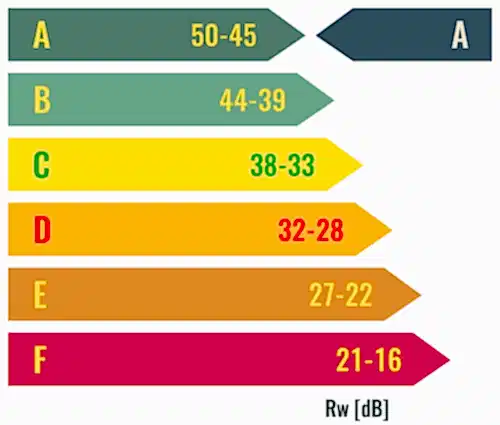
HOW THICK IS ACOUSTIC GLASS?
In domestic windows, acoustic glass tends to be between 6.4-12.8mm thick. Thicker acoustic glass is available (up to 20.8mm), however, at that thickness the glass becomes very heavy, making it difficult to support with traditional window designs.
When it comes to commercial applications, such as internal partitions, sound studios and meeting rooms, thicker glass can be used. Glazing that is 20.8mm thick has a Weighted Sound Reduction Index of 42dB.
Types of Acoustic Glass
Acoustic glass is manufactured by select specialist companies. The following are they:
- St. Gobain
- Pilkington
- Guardian Glass
- Table
TRIPLE GLAZING NOISE REDUCTION
Does triple glazing reduce noise?
Yes and no. When compared to standard double glazing, triple glazing can reduce noise by simply placing another barrier in the way of the noise. However, as standard triple glazing is not designed to combat noise, it can actually make things worse. You see, two air gaps can create resonance and echo chambers. This can actually make the original noise complaint worse or introduce new noise issues to your property.
In order for triple glazing to reduce noise pollution, three things need to done:
- At least one layer of acoustic laminated glass needs to be used
- The glazing needs to be of different thicknesses
- The window needs to be acoustically treated
If these steps are not taken, triple glazing will not reliably reduce noise. That said, if these steps are taken, triple glazed windows can deliver superior levels of noise reduction. In fact, our Soundproof Ultra range windows are triple glazed and boast up to 51dB reductions in noise.
See Our Triple Glazed Ranges
ACOUSTIC GLASS & THERMAL EFFICIENCY
Thermal efficiency of acoustic glass is determined by the following factors:
- The proportion of light allowed through the glass.
- The U-value – the measure of heat lost through the glass measured in Watts/metre squared per Kelvin. (W/m2K)
- The g-value – the percentage of solar radiant heat allowed through the glass.
Most double glazed acoustic units will provide a U-value of 1.2W/m²K, whilst triple glazed units are typically 0.8W/m²K. This is considered to be an A rating.
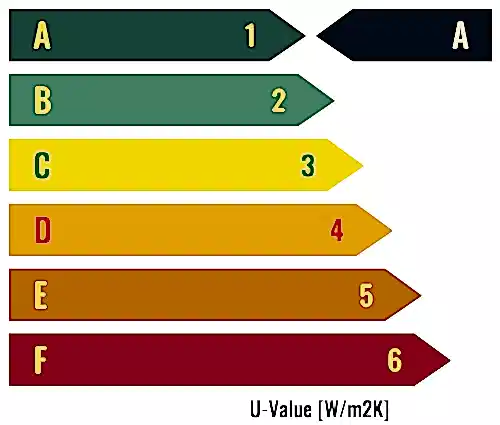
SAFETY & SECURITY
Due to the inclusion of a PVB interlayer, acoustic windows offer far greater security and safety values than their standard double or single glazing counterparts. This is due to the fact that the glass will not shatter upon impact, and will rather keep its shape if damaged (imagine how a smashed windscreen looks), preventing people gaining entry to your property, or getting injured.
APPLICATIONS
Acoustic glass is recommended in properties that suffer from noise pollution originating from aircraft, railways and road traffic. Fundamentally any consistent noise complaint of over 50dB would benefit dramatically.
ACOUSTIC GLASS PARTITIONING
Acoustic glass can also be used as a partitioning unit in offices or other work spaces in order to create secure, soundproof rooms without compromising on natural light or damaging the aesthetic with solid walls.
LOOKING TO SOUNDPROOF YOUR PROPERTY?
ACOUSTIC WINDOWS
Crafted from top of the line timber, installed using acoustic sealants, and secured with superior lock and handle systems. Our acoustic windows are completely customisable, and are available in casement, sash and modern tilt and turn designs.
ACOUSTIC DOORS
From French doors, to patios and front doors, our soundproof doors let natural light in, keep unwanted noise out, and ensure your property remains secure.
FAQs
How effective are your acoustic sash windows?
When it comes to soundproofing your home, yes. Acoustic glass is specially designed to reflect, absorb and dampen soundwaves, whereas triple glazing tends to be designed to improve thermal efficiency. In fact, triple glazing can even increase noise in your home by creating an echo chamber and amplifying the sound.
Many windows with acoustic glass will actually perform as well as triple glazing when it comes to preventing heat loss too. And some more advanced acoustic window systems (like our Ultra soundproof mock sash windows) will include triple acoustic glazing in their design to further reduce noise intrusion.
How much does acoustic glass cost?
Acoustic glass is more expensive than traditional glazing. This is because it has been specially treated in order to prevent noise intrusion.
Can I replace my double glazed windows with acoustic glass?
It may be possible to replace your existing glazing with acoustic glass, however there are two important things to bear in mind:
Acoustic glass is heavy. Unfortunately your existing window frames may not be able to support the thicker glazing.
Acoustic glass is only as effective as the window. If the window frame and the surrounding area have not been acoustically treated, the acoustic glass will not prevent noise intrusion by itself.What is the difference between acoustic and laminated glass?
All acoustic glass is laminated, but not all laminated glass is acoustic. Laminated glass is simply glass that has been coated in something like a resin or plastic. This can be to toughen the glass, so that it won’t smash when hit, or to improve its acoustic properties. In the case of acoustic glass, the glazing tends to be laminated with polyvinyl butyral (or PVB). This is a resin used to strongly bind the glazing together without compromising on optical clarity, and to absorb sound.
Does thicker glass reduce noise?
Yes and no. Glass isn’t a good conductor of sound, so it stands to reason that the thicker the piece of glass, the harder time sound will have trying to get through. That said, glass has something known as a “resonance frequency”. This is the pitch at which it will harmonise with a sound, and actually amplify the noise. Glass of all thicknesses will have this resonance frequency, so no matter how thick you go, there will always be a frequency at which the glass will actually make noise louder. This is the reason why acoustic window systems will employ glass of two different thicknesses – to combat the resonance frequency in the other.
CONTACT US
We want to help you find the right product that suits you, so whether you want to talk to us about our soundproof windows, or simply about noise reduction and double glazing, we’re here to help.
10 YEAR INSURANCE BACKED GUARANTEE
All of our products come with up to a 10 Year Insurance Backed Guarantee provided by the Consumer Protection Association. So you can rest assured that your home is in safe hands.
We have been Trading Standards Approved and are proud to be enrolled on the Buy With Confidence Scheme, ensuring customers just like you have their interests protected.
TRUSTMARK REGISTERED FOR QUALITY
Consumers can feel confident using a TrustMark registered business, as the government-endorsed scheme ensures high quality service and a range of consumer protection options.
AWARD-WINNING PRODUCTS & INSTALLATION
Following awards in 2020, and 2021, The Soundproof Windows was announced as the ‘Best Acoustic Window & Door Installation Company – London’ at the SME News Awards 2022.
10 YEAR INSURANCE BACKED GUARANTEE
All of our products come with up to a 10 Year Insurance Backed Guarantee provided by the Consumer Protection Association. So you can rest assured that your home is in safe hands.
We have been Trading Standards Approved and are proud to be enrolled on the Buy With Confidence Scheme, ensuring customers just like you have their interests protected.
TRUSTMARK REGISTERED FOR QUALITY
Consumers can feel confident using a TrustMark registered business, as the government-endorsed scheme ensures high quality service and a range of consumer protection options.
AWARD-WINNING PRODUCTS & INSTALLATION
Following awards in 2020, and 2021, The Soundproof Windows was announced as the ‘Best Acoustic Window & Door Installation Company – London’ at the SME News Awards 2022.
